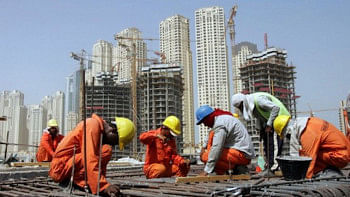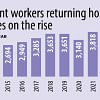Challenges that our migrant workers face

On December 18, the global community acknowledges and celebrates the contributions of millions of migrants worldwide. Through their hard work and under challenging circumstances, migrant workers of Bangladesh not only bring a big difference to their own households, but also to the economies and societies of their countries of origin and destination. There is also a growing recognition of the migrant workers' contribution to the attainment of sustainable development goals.
Bangladeshi migrant workers require a range of services and support at both the origin and destination ends. Successive governments have framed policies and laws and established institutional frameworks to cater to the multifaceted needs of our migrant workers. However, despite the progress made over the last few decades, a lot more still needs to be done. For one, there is a major gap in rendering support to these workers in the destination countries. The capacity of extending such support is largely conditioned by policies in the destination countries concerned. Resource mobilisation for the offices of labour attached to those countries is another major constraint.
Lack of information about availability of work in destination countries and securing work visas are perhaps the most daunting issues an aspiring migrant worker faces in Bangladesh. The information dissemination initiatives of the government and non-government sectors on safe and regular migration—though important—have thus far remained largely inadequate. Likewise, at the destination end, the migrated workers have little knowledge about their rights, duties, and entitlements. Left to the whims of their kafeel (sponsors), Bangladeshi migrant workers are mostly unaware about where and how they can seek redress for the failings of their recruiters and employers. The limited capacity of Bangladesh missions and the absence of civil society institutions in most destination countries make the workers vulnerable to exploitation and abuse.
Lack of information about availability of work in destination countries and securing work visas are perhaps the most daunting issues an aspiring migrant worker faces in Bangladesh. The information dissemination initiatives of the government and non-government sectors on safe and regular migration—though important—have thus far remained largely inadequate. Likewise, at the destination end, the migrated workers have little knowledge about their rights, duties, and entitlements.
Among the South Asian countries, migrant workers from Bangladesh have to bear the highest migration cost. There is a huge gap between the state-set cost of migration and the amount that workers actually have to pay an agent for facilitating their migration. Visa trading at the destination end, propensity to earn more profit by the syndicates of unscrupulous commanding recruiting agencies with access to corridors of power, prevalence of a series of intermediaries at home and abroad, and the near-absence of oversight mechanism by the state have all contributed to the high migration costs in the country. Needless to say, high migration costs negatively impact migrant workers' well-being.
Bangladeshi workers dominate the low-skilled category in most labour markets in the Gulf as well as Southeast Asian countries. Lack of skills and education not only subjects them to low pay, but it also makes them vulnerable to ill treatment and abuse. To upgrade the skills of the workforce in general, including the migrant workers, Bangladesh has invested large sums of resources in establishing technical training centres in different parts of the country over the last decade or so. It is time investments were made to upgrade the capacity of the trainers and introduce courses that are in demand in destination countries. The burgeoning demands for care providers, medical technicians, nurses, and also for workers in hospitality and tourism sectors (which require soft skills) call for out-of-the-box planning for skills development.
There is a major gap in migrant workers' access to justice, both in countries of origin and destination. While procuring their work visas, aspirant workers are often subjected to fraudulent practices by recruiting agents and their informal intermediaries. In many instances, they are provided false information on jobs, wages, and other entitlements that are not reflected in reality. Despite being subjected to deceit, our migrant workers have little scope to seek legal recourse. At the destination end, many workers endure a lot of hardship, including non-placement against jobs promised, non-payment and irregular payment of wages, and physical and verbal abuse. The workers' inability to understand the local language and to secure services of interpreters and legal counsels, as well as non-availability of legal aid support, deprive them of their right to access justice.
Healthcare of migrant workers in destination countries is one of the most neglected areas in policy discourse. Over the last couple of years, three Vital Signs reports on the healthcare provisions, death of migrant workers, and impact of climate change on migrant workers in the Gulf region shed important light on the deficits that exist. Migrant workers' lack of access to non-emergency healthcare services was identified as a major problem. Another shortcoming is an increased privatisation of the healthcare system in the Gulf states and employers' lack of interest and accountability in procuring and renewing appropriate medical insurance for their workers. The higher temperatures caused by climate change have adversely impacted and will further impact migrant workers who work in open spaces, such as in construction and plantation sectors. The generally challenging work and living conditions of migrant workers often take a toll on their health, leading to many untimely deaths. The causes of migrants' deaths are also not always duly recorded, leading to loss of compensations for the deceased workers' families.
Return and reintegration of migrant workers are yet another area for policy intervention. During the post-Covid period, the reintegration strategies framed in Bangladesh largely focused on extending loans to returnee migrants. While such schemes are critical for returnee workers who wish to engage in entrepreneurial activities, a reintegration strategy must also encompass those who may not be interested in business ventures, those who have specialised skills, those who have returned empty-handed, and those who have endured trauma and abuse.
Over the years, the civil society in Bangladesh has rendered invaluable support to policy and legislative formulation processes pertaining to labour migration. They have also had major engagement with migrants and their families on information dissemination for safe migration, remittance transfer and utilisation, financial literacy, and access to justice including alternative dispute settlement. Academia has played a critical role in generating new knowledge based on lived experiences of labour migrants, both on the origin and destination ends. There is a strong case to meaningfully and substantively incorporate the perspective of civil society in policy planning and implementation. Most importantly, the voices of migrant workers are critical for deciding on sound and effective policies.
In 2023, International Migrants Day is being observed as Bangladesh is going through a grave foreign reserve dip. Perhaps now is the time for this nation to commit to addressing the complex array of problems that our migrant workforce encounters both here and abroad.
Dr CR Abrar is an academic and executive director of the migration think tank Refugee and Migratory Movements Research Unit (RMMRU).
Views expressed in this article are the author's own.
Follow The Daily Star Opinion on Facebook for the latest opinions, commentaries and analyses by experts and professionals. To contribute your article or letter to The Daily Star Opinion, see our guidelines for submission.

 For all latest news, follow The Daily Star's Google News channel.
For all latest news, follow The Daily Star's Google News channel. 










Comments